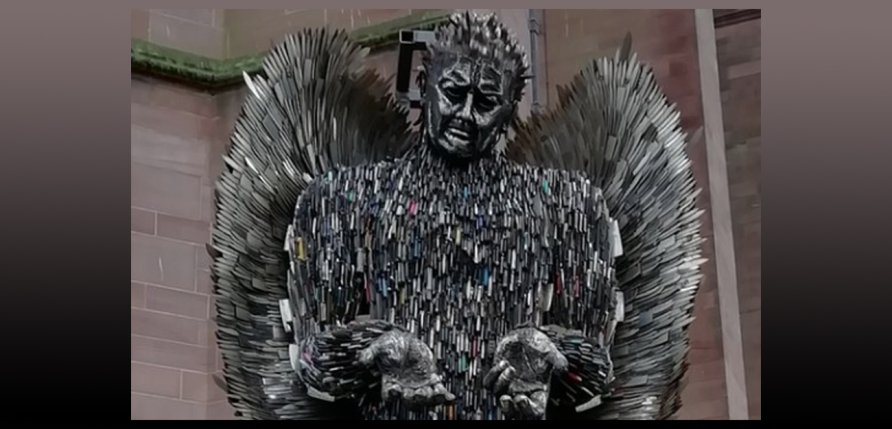
The Knife Angel sculpture, created by artist Alfie Bradley, will be moving to Hull at the end of January after spending Christmas and New Year outside Liverpool’s Anglican Cathedral.
It is an amazing sight, and one that from a distance looks simply like a sculpture of an angel. However, get a bit closer and you can see that it’s created from thousands of knives. The artist spent two years designing and building the 26 foot monument at the British Ironwork Centre in Shropshire, using 100,000 knives which had been handed in to police stations around the country. The aim of many involved in the project is for the Angel to go on a national tour raising awareness of knife crime.
Knife crime is growing across the UK and it is increasingly common to read and watch news stories about it; either arrests of those caught carrying knives or worse those who have been killed, hurt or affected by knife crime.
In 2017-18 (year ending March 2018) knife crime increased 16% on the previous year with over 40,000 offences recorded. After reaching a peak of just over 30,000 in 2011 offences declined until 2015 but have been gradually rising since.
Perhaps the most worrying statistic is that 1 in 5 offences with knives were committed by under 18’s.
London holds the highest number of knife offences compared with other large cities, with 137 for every 100,000 people. More than double the next region of the West Midlands, with 65 offences per 100,000 people. It is for this reason the creators of the Knife Angel want it to be on display in the capital and have started a petition to get it there.
Security Industry and Knife Crime
The danger for those working as Security Guards and Door Supervisors is increasing with the growth in knife crime. We wrote about it in 2016 when the statistics were beginning to increase again, although they were still only just over half of those today; 26,370 in 2015-16.
The risks are obvious and became especially clear on New Year’s Day when Tudor Siminov, a 33 year old Security Guard, was fatally stabbed while working at a New Year’s Eve party in London’s West End. Siminov was trying to prevent gatecrashers from entering the party when he was stabbed. Three of his colleagues were also injured and taken to hospital.
Security operatives are trained to avoid risk to themselves and others; conflict management and physical intervention skills are essential when working in a venue where there is potential for aggressive behaviour. It is vital for security companies to ensure their staff are fully trained and briefed so they have the skills and knowledge to be able to protect themselves and members of the public.

